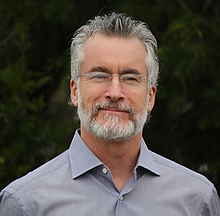 Michael Cummings, a professor of biology and expert in molecular evolutionary genetics, has been reappointed as director of the Center for Bioinformatics and Computational Biology (CBCB) for five years, effective July 1, 2022.
Michael Cummings, a professor of biology and expert in molecular evolutionary genetics, has been reappointed as director of the Center for Bioinformatics and Computational Biology (CBCB) for five years, effective July 1, 2022.
“Michael is a valuable asset to our research community—both as a strong computational biologist with a broad range of scientific interests, and as an excellent administrator,” says Mihai Pop, director of the University of Maryland Institute for Advanced Computer Studies (UMIACS), which supports CBCB and six other major centers on the Maryland campus.
In the metrics-based CSRankings, the University of Maryland is ranked fourth in the nation in bioinformatics and computational biology. Cummings says this is due in large part to the many excellent people who make up CBCB.
“Our faculty are highly intelligent and productive, which results in high impact and funding level per faculty member,” he says. “The graduate students and other trainees are creative and enthusiastic. Of course, the broader UMIACS community—staff, faculty, students—help to make our successes possible.”
CBCB is focused on researching questions that arise from the genome revolution, studying pathogen genomics, microbiome research, epigenetics, molecular evolution, transcriptional regulation, metabolic modeling, and more.
One of Cummings’s ongoing projects is an open-source, evolutionary analysis software called BEAGLE. It is an essential component in the software workflow used by many scientists studying the evolutionary history of organisms, including viruses that cause AIDS, influenza, Ebola and now COVID-19.
He is also part of a team that recently received $2.7 million from NIH to study how aging impacts the brain, by using machine learning techniques to interpret multiomics data.
Looking forward, Cummings says that his vision is to continue promoting an inclusive culture and further increase the center’s diversity. He also wants to continue creating a supportive and stimulating environment where all members of the community are productive and feel fulfilled.
Cummings notes that he is currently focused on helping CBCB’s newest faculty, assistant professors Brantley Hall and Erin Molloy, develop and expand their already successful research programs as they move toward tenure and promotion.
Cummings has served has the director of CBCB since 2019. He came to the University of Maryland in 2003 as a visiting associate professor, and was the first person to be hired in CBCB. He completed his doctorate in organismic and evolutionary biology at Harvard University, and postdoctoral research at the University of California, Berkeley.
—Story by Maria Herd